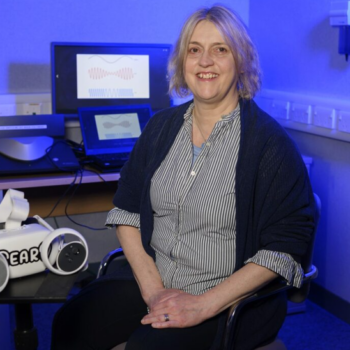Deaf teen helps build VR therapy for hearing-impaired youth
“When it’s too noisy you can get overwhelmed and zone out. It can make socialising with friends very difficult and can be incredibly isolating.”
Kaitlyn is a 20-year-old actor and theatre student from London who was born profoundly deaf. She’s had cochlear implants to help with her hearing since she was three but the implants are far from a complete fix.
She explains: “Cochlear implants are amazing but I don’t hear what a hearing person hears. I have to work incredibly hard to lip read or find a visual way of communicating, such as British Sign Language.”
Kaitlyn is now hoping to help a generation of D/deaf children and young people thanks to her involvement in an innovative new virtual reality medical trial.
“It can be challenging growing up being deaf. Lots of everyday situations can be a struggle, from playing sport to crossing the road.
“Even when you’ve had positive experiences at school with lots of support and deaf friends, conversations can be difficult and exhausting. You can’t work out where voices are coming from and by the time you’ve found who’s speaking you’ve missed the first half of what they said.
“With cochlear implants, you’re constantly hearing new sounds that you either haven’t noticed before or just haven’t been tuned into. It can be quite scary hearing a new sound and thinking ‘should I be worried or is that okay?’ Finding ways to improve your ability to identify sounds is so important.”
In an effort to improve the lives of children and young people with similar hearing difficulties, Kaitlyn has been involved in testing and developing a Virtual Reality gaming trial that is intended to help use both ears (BEARS) together, to train listeners to better locate sounds. This is something that children and young people with cochlear implants find difficult. The BEARS suite of games includes a variety of immersive, 3-D sound and vision experiences, such as target practice, music games, and serving customers in a busy cafe.
Funded and supported by the NIHR and led by Deborah Vickers (pictured, top right) from the University of Cambridge and Dan Jiang from Guy’s and St Thomas’ NHS Foundation Trust, the project brings together speech and language therapists, surgeons, audio engineers, audiologists and children and young people using cochlear implants to create games.
Kaitlyn’s involvement began at 18 years old when she saw a flyer about the project while attending an appointment at Guy’s and St Thomas’. Intrigued by the potential of VR, she volunteered.
“My brother played VR games at home so I thought it sounded exciting and wanted to give it a go.”
She explains: “I played the games at home every week for three months and afterwards I noticed my sound location skills had improved – even after this short period of time. I fed back on the games so they could be developed further to make them as user friendly for children and young people as possible.”
Over 160 children and young people are currently enrolled onto the trial at sites in Belfast, Birmingham, Bradford, Cambridge, Kilmarnock, London, Manchester, Middlesbrough, Nottingham, Oxford and Southampton.
Jameel Muzaffar, NIHR National Specialty Lead for Ear, Nose and Throat Surgery & Audiology says: “Cochlear implants, while life-changing, do not restore natural hearing. They act as an electronic ear and send electrical pulses to the hearing nerve via electrodes placed inside the ear. But children and young people still struggle with combining sounds from both ears and listening skills don’t just come to you – you have to sit down and improve them.
“The BEARS project represents a major step forward in addressing these issues. By offering a tailored, interactive, and patient-centred approach, the BEARS VR-based training games have the potential to transform spatial hearing skills, improve understanding of speech in noisy conditions and enhance quality of life for young cochlear implant users.”
From a personal perspective, Kaitlyn sees the potential for the trial to help children and young people long into the future. “The games are not only fun for children and young people to play but it could help with real life skills so that when they are older, they feel more confident and won’t feel like they’ve been held back. They’ll feel like they managed to achieve something in the game so they can feel confident doing it in real life too.
“Living with a cochlear implant can be a struggle and so anything that could help make children and young people’s lives with them a little easier is fantastic.”
- If you’re interested in taking part in BEARS, go to: Be Part of Research
- This story originally appeared on the NIHR website



